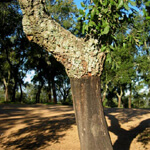
An over-the counter herbal supplement derived from the Amur cork tree (Phellodendron amurense) killed a high percentage of cultured prostate cancer cells in studies conducted at The University of Texas Health Science Center at San Antonio.
“This compound is a natural product extracted from the bark of the tree,” said A. Pratap Kumar, Ph.D., associate professor of urology at the Health Science Center and the study’s principal investigator. “People long have used the bark of this tree for stomach ache, dysentery and kidney problems, but it has never been known whether it is useful for cancer. Ours is the first report of this particular extract’s robust ability to kill prostate cancer cells in culture.”
The Amur cork tree is native to the Amur River watershed in the Manchurian regions of northeastern China and far western Russia.
Dr. Kumar and his colleagues incubated prostate cancer cells and exposed them to the bark extract. After 72 hours, they noted considerable anti-cancer effect. “The important thing is that because this is a natural compound, it promises to be a very cost-effective treatment for prostate cancer if we can show it also works on tumors in vivo (in the body),” Dr. Kumar said.
In a few months, the scientists hope to come out with results in an animal model of prostate cancer, he said. Dr. Kumar has a two-year, $500,000 grant from the National Cancer Institute.
The collaborators reported the finding in the journal Neoplasia. The research suggests that the cork tree extract blocks activity of a protein called CREB that is involved in cell death. CREB also recently was reported to be a marker for leukemia, but it is not known whether the cork tree extract may have use in leukemia or other types of cancer, Dr. Kumar said.
“This compound has enormous potential for moving from the discovery in Dr. Kumar’s laboratory into clinical trials and actual clinical use here at the Health Science Center,” said Ian Thompson, M.D., professor and chair of the department of urology. “It is this remarkable merger of science and clinical trials here in San Antonio that is advancing the care of patients with cancer, hastening the time when we can cure this disease,” he said.
Next Pharmaceuticals Inc. of Carlsbad, Calif., makes the supplement, which is sold over the counter as Nexrutine®, and the company provided a supply of the compound for this study. Next Pharmaceutical Inc.’s Web site is www.nextpharmaceuticals.com.

